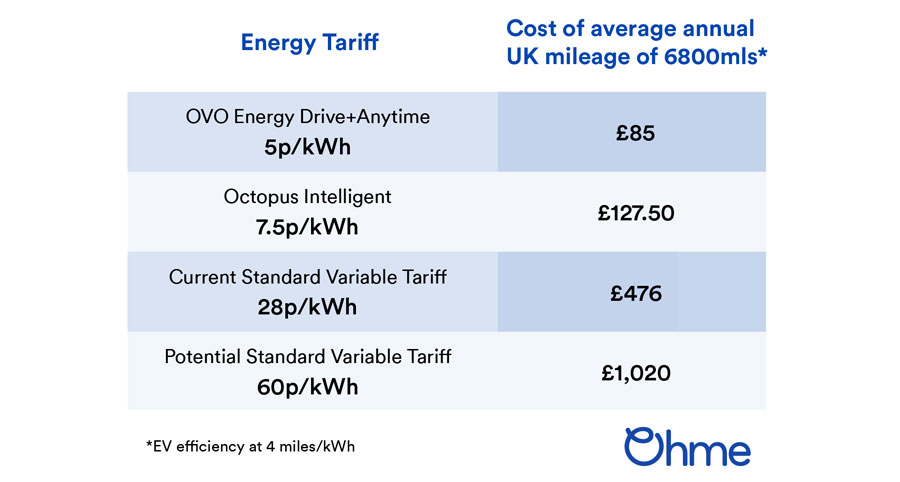Future proof your EV charging costs

You'd be hard pressed not to have noticed the predictions of huge increases in energy that are on the way. As more industry experts warn of dramatic increases in energy prices this winter, it's crucial that electric vehicle drivers ensure that they are on the best possible smart charging tariffs at home.
That particular piece of advice comes from award-winning EV smart charger provider Ohme.
Ohme is the UK's leading smart charging platform provider and the official charger provider for customers on the Motability scheme, the largest UK fleet operator in the UK. It has also been named as the Best Electric Charging Point Provider by Business Motoring and voted number one for customer service in Auto Express magazine's 2022 Driver Power survey. It's safe to say it knows a thing or two about charging electric vehicles then.
Until now, EV drivers have taken advantage of the incredible savings compared with driving a petrol or diesel car. With predictions for the wholesale prices of energy to more than double this winter, the cost of a unit of electricity could rise to as high as 60p per kWh (up from the current 28p/kWh). Drivers of electric vehicles will be hit especially hard by this increase as it could see their running costs rise dramatically.
That doesn't mean you'll see EV drivers tearing their hair out over rising costs though. It will remain considerably less expensive to recharge an EV than to fill your fuel tank the old-fashioned way. EV drivers can also protect themselves from the worst of the forthcoming rises by charging their car using a smart charger and signing up for one of the discounted off-peak tariffs available from energy suppliers.
Charging an electric vehicle on the right tariff means EV drivers can still enjoy all the benefits of lower running costs.
You can recharge your EV for the equivalent of just 1.9 pence per mile with the likes of Octopus Intelligent at 7.5p/kWh. That means a typical UK driver's annual mileage of 6800 miles in an average EV could cost just £127.50. By comparison, charging at the current Standard Variable Tariff of 28p/kWh, that same annual mileage would cost a driver £476. If, as predicted, that standard electricity tariff rises to 60p/kWh, those same 6800 miles would cost an EV driver £1020 – eight times more than on an off-peak tariff (see graphic). 
That's the equivalent of around 10 tanks of fuel at current prices, and nobody is going to be driving nearly 7000 miles on that. Even if you're paying full price for your electricity you'll still be significantly better off with an EV.
“It's great that so many drivers have made the switch to an electric vehicle, but if they're not already on an off-peak tariff, those drivers need to quickly review their options to protect themselves from these future wholesale price rises,” warns Ohme CEO, David Watson.
Ohme's advice is to first speak to your existing electricity supplier and see if they offer an off-peak tariff such as Octopus or OVO Energy. If they don't, then look at switching suppliers to one that does so that you can off-set the impacts of the price increases that experts are predicting.
You'll also need to install a smart charger such as Ohme's Home Pro. A smart charger can connect with the national grid in real time and automatically adjust its charging for drivers to take advantage of off-peak tariffs. A smart charger could also offer drivers the option to charge their car when renewable energy generation on the National Grid is at its highest, further lowering their CO2 impact.
Of course, if you're an EV driver, or you are a prospective EV owner looking to lease a new EV, you don't actually have to do anything at all. Even if you pay the full variable rate for your electricity, and even if the prices go through the roof later in the year, you'll still be much better off in terms of running costs. But why would you do that when a simple phone call can save you hundreds of pounds every year?
View our latest blog posts

Categories
Pages
We are a family run business based in rural Worcestershire. Our team of 38 staff are on hand to provide an exceptional service to personal and business customers.
Read More
